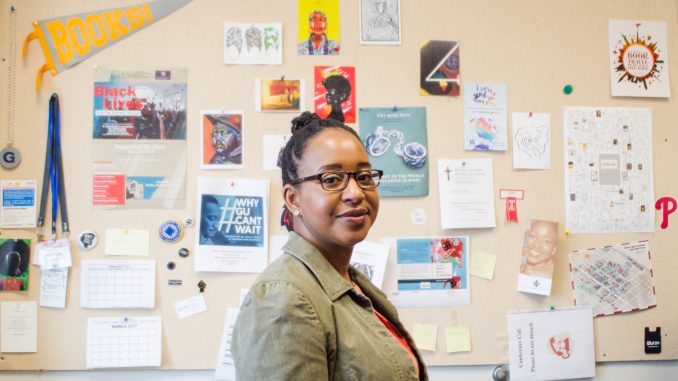
Nyasha Junior first learned about the Bible during Sunday sermons as a child. Now, she uses it as a textbook in her classroom.
“I think that it is important to provide an environment to question the Bible,” said Junior, a religion professor. “Many students may not have had the opportunity to ask these questions, especially those who have a Catholic background where the Bible can be taught as a singular meaning.”
Junior has studied how women react and relate to the Bible. She teaches the graduate course Feminist and Womanist Biblical Interpretation, which explores women’s depictions in the Bible. She also wrote “An Introduction to Womanist Biblical Interpretation,” a book published in 2015 that discusses how Black women commonly teach and interpret the Bible outside of academia.
Junior said she was inspired to teach religion as a graduate student at Princeton University when she was introduced to women in the Bible who she hadn’t learned about before.
“A lot of what I did was uncharted waters for me,” Junior said. “The women I read about in the Bible interested me and inspired me to take a feminist approach to the Biblical text.”
She said some women have important roles in the Bible but are still rarely mentioned when the text is being taught, like Sarah, the wife of Abraham who is one of the first patriarchs of Judaism.
Junior said the text discourages women from being involved in religion since it prevents them from taking leadership positions in the church. Today, in Catholicism, women still can’t be priests.
Laura Levitt is a religion, Jewish studies and gender professor who focuses on the culture surrounding the practice of religion and how women are involved.
“People think that feminism is somehow antithetical to religion, but that simply isn’t true,” Levitt said. “Women play a role in religion, and the work of feminist religious professors is to encourage the study and interpretation of the role that they play.”
Junior said her work asks the question, “How can reading and looking at contemporary issues alongside the Biblical text help us understand what is going on in the lives of women?”
“I don’t like to point these issues out to students at first,” Junior said. “I tell the story and ask, now where do you see this today?”
Junior said there are several stories in the Bible depicting violence toward women. She said reading 2 Samuel 13:14, in which a woman is raped, sparked discussion about on-campus sexual harassment in her class.
“The issues we discuss are relevant and important,” Junior said. “It’s important that everyone has some understanding of ancient religious texts.”
Patrick Bilow can be reached at patrick.bilow@temple.edu.



Be the first to comment